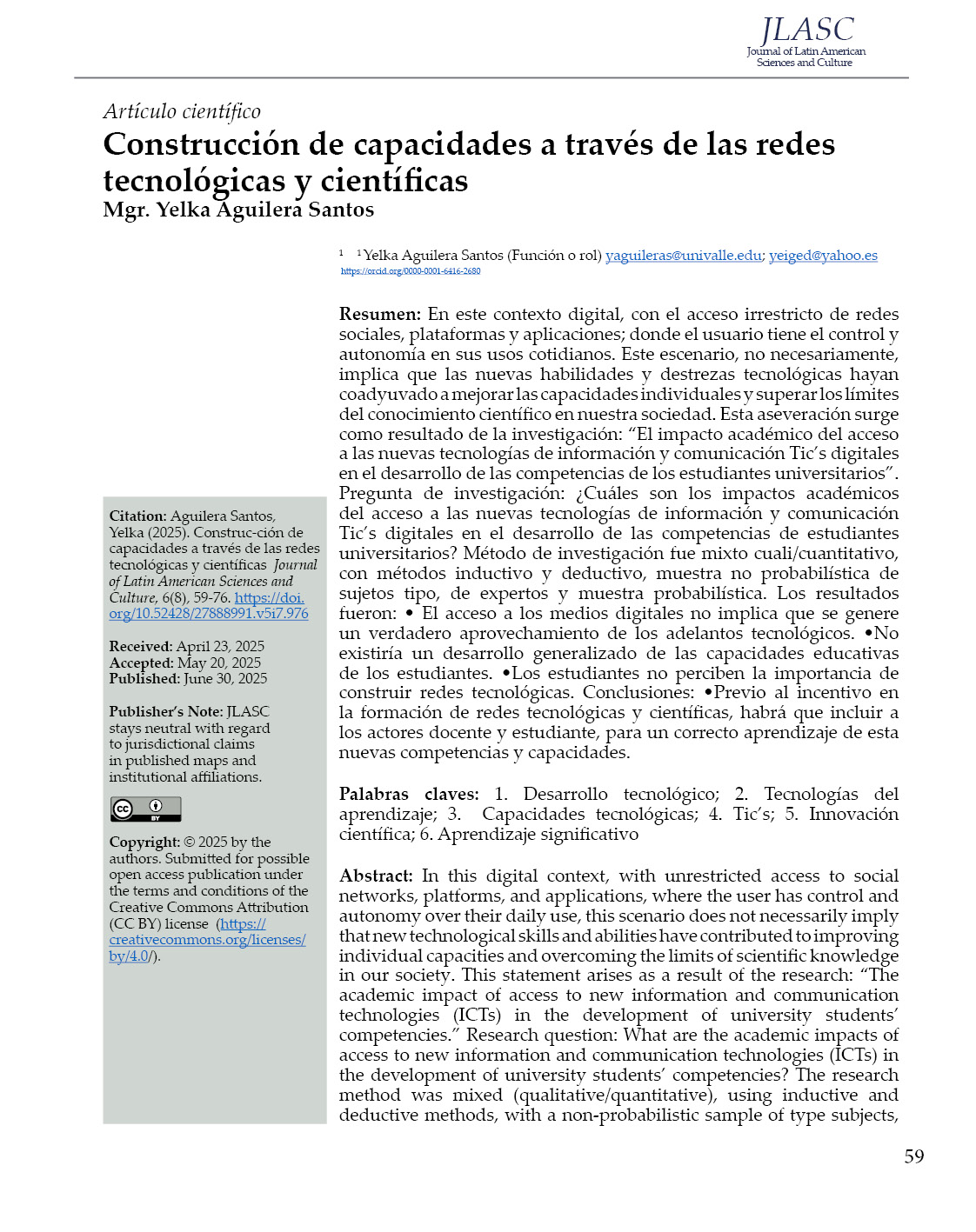Building capacities through technological and scientific networks
DOI:
https://doi.org/10.52428/27888991.v7i10.1299Keywords:
Technological development, Learning technologies, Technological capabilities, ICTs, Scientific innovation, Meaningful learningAbstract
In this digital context, with unrestricted access to social networks, platforms, and applications, the user has control and autonomy in their daily use. However, this does not imply that new technological skills have improved individual capacities or overcome the limits of scientific knowledge in our society. This assertion comes from research on the academic impact of access to new information and communication technologies on the development of university students' competencies. The research question focuses on the academic impacts of these technologies on students. A mixed research method was used, combining qualitative and quantitative approaches, with samples of expert and non-probabilistic subjects.
The results show that access to digital media does not guarantee a real utilization of technological advancements, that there is no widespread development of students' educational capacities, and that students do not perceive the importance of building technological networks. Therefore, before incentivizing the formation of technological and scientific networks, it is necessary to include both teachers and students for proper learning of these new competencies.
Downloads
References
Alemán Pedro Alfonso. El papel de la universidad en el proceso de formación para la economía solidaria. Revista Virtual Universidad Católica del Norte [en linea]. 2008, (24), 1-15[fecha de Consulta 28 de julio de 2024]. ISSN: 0124-5821. Disponible en: https://www.redalyc.org/articulo.oa?id=194220359003
Ausubel, D. (1983). Teoría del aprendizaje significativo. Fascículos de CEIF, 1(1-10), 1-10.
Hernádez Sampieri, R, & Mendoza, C. (2018). Metodología de la Investigación: las rutas cuantitativa, cualitativa y mixta. Editorial McGRAW-HILL INTERAMERICANA EDITORES, S.A. https://www.academia.edu/download/64591365/Metodolog%C3%ADvestigaci%C3%B3n.%20Rutas%20cuantitativa,%20cualitativa%20y%20mixta.pdf
Pescador, B. (2014). ¿Hacia una sociedad del conocimiento? Revista Med, 22(2), 6-7. Recuperado de http://www.scielo.org.co/scielo.php?script=sci_arttext&pid=S0121-52562014000200001. [ Links ]
https://doi.org/10.18359/rmed.1194 DOI: https://doi.org/10.18359/rmed.1194
Méndez, E., Figueredo, C., Goyo, A. y Chirinos, E. (2013). Cosmovisión de la gestión universitaria en la sociedad de la información. Negotium, 9(26), 70-85. Recuperado de http://www.redalyc.org/articulo.oa?id=78228464004. [ Links
Solano Carrillo, D. G. (2021). Reseña del libro Enseñar a nativos digitales de Marc Prensky (2015). Ciencias Sociales Y Educación, 10(20), 335-341. https://doi.org/10.22395/csye.v10n20a17
https://doi.org/10.22395/csye.v10n20a17 DOI: https://doi.org/10.22395/csye.v10n20a17
Mon, Francesc Esteve, Cervera Mercè Gisbert. Competencia digital en la educación superior: instrumentos de evaluación y nuevos entornos. Enl@ce: Revista Venezolana de Información, Tecnología y Conocimiento [en linea]. 2013, 10(3), 29-43[fecha de Consulta 29 de Julio de 2024]. ISSN: 1690-7515. Disponible en: https://www.redalyc.org/articulo.oa?id=82329477003
Hernádez Sampieri, R, & Mendoza, C. (2018). Metodología de la Investigación: las rutas cuantitativa, cualitativa y mixta. Editorial McGRAW-HILL INTERAMERICANA EDITORES, S.A. https://www.academia.edu/download/64591365/Metodolog%C3%ADvestigaci%C3%B3n.%20Rutas%20cuantitativa,%20cualitativa%20y%20mixta.pdf

Downloads
Published
How to Cite
Issue
Section
License
Copyright (c) 2025 Yelka

This work is licensed under a Creative Commons Attribution 4.0 International License.
Authors who publish in this journal accept the following conditions: The authors retain the copyright and assign to the journal the right of the first publication, with the work registered with the Creative Commons 4.0 attribution license, which allows third parties to use what is published as long as they mention the authorship of the work and the first publication in this journal. Authors may make other independent and additional contractual agreements for the non-exclusive distribution of the version of the article published in this journal (eg, include it in an institutional repository or publish it in a book) provided that they clearly indicate that the work it was first published in this magazine. Authors are allowed and encouraged to share their work online (for example: in institutional repositories or personal web pages) before and during the manuscript submission process, as it can lead to productive exchanges, more and more quick citation of published work.








